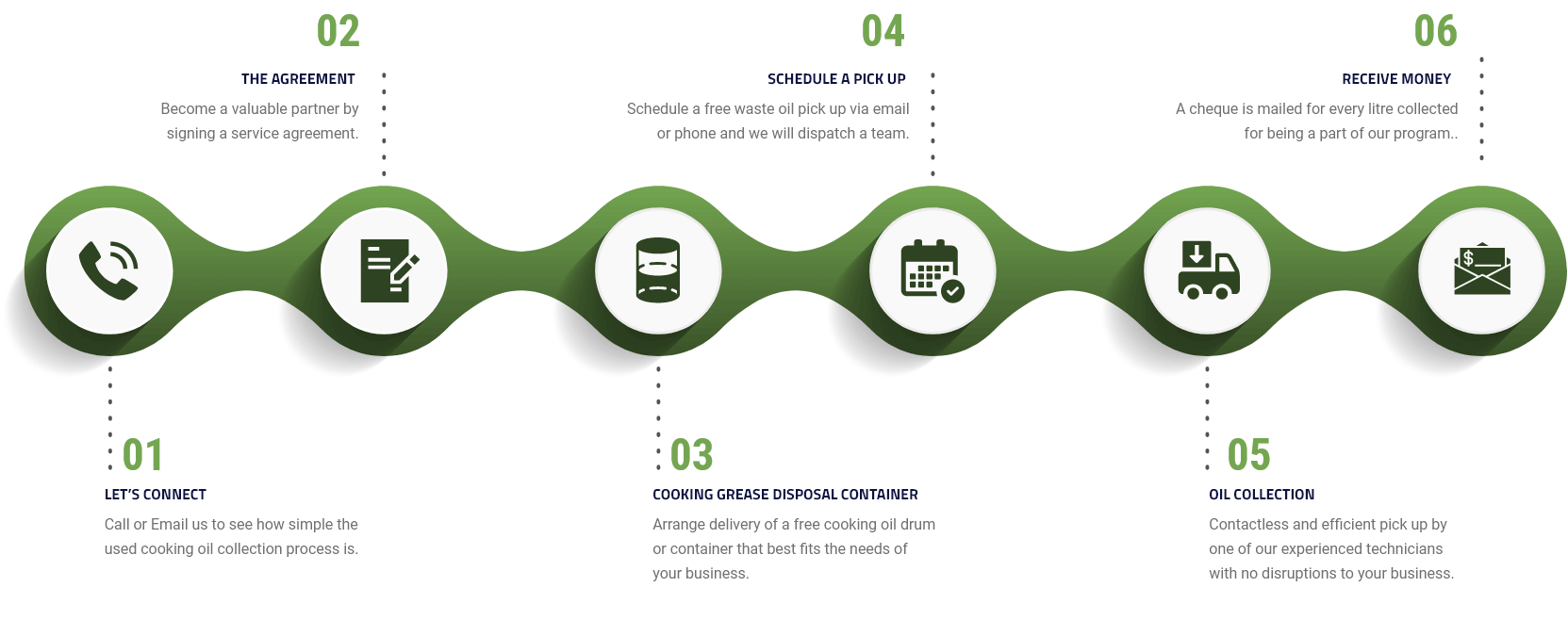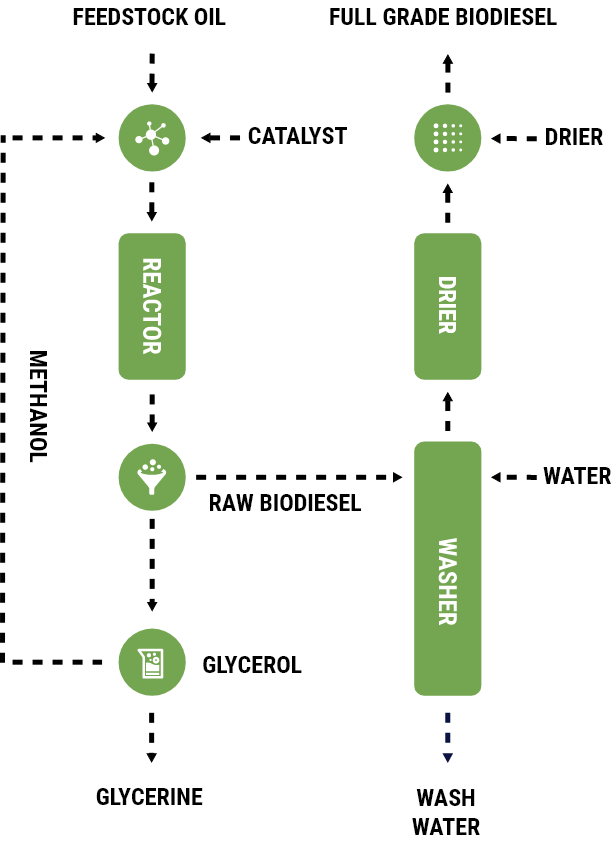// our programs

Partnership Rewards Program
Our partners can join our program and earn money rather than pay to get rid of their old cooking oil. We work with our current and future partners to make sure we pay them a fair price for each litre of oil collected. Join us to make a better world by reducing greenhouse gases, fossil fuels and air pollutants. Please contact us for a complete list of prices.
As part of an ongoing SEO campaign, our partners can gain exposure from being featured on our website. Consumers can rate, read, and review your restaurant as well as view some of our community partners
Lower Mainland Biodiesel offers initiative rewards:
-
Local partnership program to increase customers
-
Free and flexible pick up 24/7
-
Pay members for every litre of cooking oil
-
Free custom waste bins or containers with locks
-
Help the environment and lower GHG emissions
-
Exposure on our website through link building and backlinks
-
Mentions in our blogs, articles and newsletters
Our Process in 6 Easy Steps
How To Responsibly Dispose Of Used Cooking Oil And Earn Money Doing It


How It’s Made
The key component of biodiesel is mono-alkyl esters. It is from triglycerides in fat reacting with simple monohydric alcohol. Reaction completeness is the most critical fuel quality parameter. It takes the right balance between reaction temperature and time.
We remove impurities from the feedstock during the pre-treatment process. Examples are dust, burnt food, and water gain. Transesterification is then carried out by chemically reacting the lipids with an alcohol (methanol) and a catalyst (sodium or potassium hydroxide). The result is methyl esters. These esters then get treated to get all the soap, glycerol, excess alcohol, and water out. Biodiesel comes from the fatty acid esters formed during this process
Benefits

about us.
WHY COUNT ON US
With a full-service collection process, you can stop worrying about your used oil. We work with a trusted and experienced team for contactless waste pickups in the Lower Mainland. Our trained staff will handle all your collection-related tasks. From free pick-up, installation, service and maintenance of grease disposal containers, we ensure it is taken care of. Furthermore, we offer grease trap cleaning every three months or whenever you need it. Our expertise and quality of work make us the ideal choice for future and current partners.
While other companies also recycle oil, they export it to the US or produce animal food additives. We’re proud to be the only company in British Columbia (BC) that turns used cooking oil into renewable biodiesel that’s sold to people and businesses in Canada. We have recently produced fuel for one of Canada’s largest hydro companies. The need to boost economic growth while protecting the environment is very vital to us.
In collaboration with our partners, we’re starting a meaningful green media and marketing campaign. We give our partners the chance to help the environment while gaining exposure at the same time

fuel benefits
What are the advantages of using biodiesel?
It Is Biodegradable: non-toxic and biodegradable compared to petroleum diesel.
It Is Renewable: does not contribute to global warming due to its closed carbon cycle.
Reusing Waste Products: provides a market for excess production of vegetable oils and animal fats
Economic Growth: decreases the dependence on imported goods from the US and keeps growth within Canada.
Reduced Emissions: reduces carbon monoxide and particulate matter by more than 10% and unburned hydrocarbons by more than 20% compared to petroleum diesel.
Better Performance: better lubrication and reduces fuel system wear when blended with regular diesel, combusts better than conventional diesel and has a higher Cetane rating.

environmental benefits
How Does Biodiesel Affect the Environment?
Waste products generate methane gas which contributes to climate change and may harm the environment. Rather than dumping waste products in landfill sites, it is turned to biodiesel. You can mix biodiesel with petroleum-based diesel fuel with little or no change. The least amount of it in petroleum diesel is lubricating, enhancing the way the engine operates and its efficiency. It contains 11% oxygen by mass with almost no sulfur. On the rise are Original Equipment Manufacturers (OEMs) advocating the usage of lower biodiesel blends (B5) for their engines. Some manufacturers extend warranty coverage if the fuel meets certain criteria. Pure biodiesel emits 60 to 100 percent fewer greenhouse gases than petroleum diesel, depending on the oil or fat used. Greenhouse emissions are reduced by 12%-18% when blending 20% of Biodiesel with petroleum diesel (B20), and 1%- 2% when blending 2% of Biodiesel (B2).
By Using Biodiesel You Are Contributing To Helping The Environment To Over 70% Cleaner Air.

societal and economic benefits
How does biodiesel help the economy?
Agricultural produce and agro-industrial residues make biodiesel. They include slaughterhouse waste, recycled cooking oil, non-food-grade virgin oil or agricultural surplus. The biofuel industry has opened up a new market for franchisees and small business owners by valuing the used cooking oil. Many businesses are paying for waste disposal services right now. With the increasing demand for biodiesel, local businesses are able to save on disposal costs and profit from their used oil.
Increase in the domestic production of biodiesel will lead to the creation of more jobs as well as economic growth. Based on this, a study by Doylech Corp. concluded by 2030 there will be:
12,614 permanent jobs will be created
$21.3 billion per year of economic activity
$1.69 billion per year for the federal government
$1.47 billion per year for the provincial government
$107 million per year for the municipal government
Biodiesel Companies Have Created Over 14K New Jobs In Canada Since 2010.

safety
How is Biodiesel a Safer Alternative to Diesel and Petroleum?
The ignition temperature of pure biodiesel (B100) is 150°C (300°F), whereas petroleum diesel only ignites at 50°C (120°F). The flashpoint falls between the two – the temperature where biodiesel ignites – depends on the mix of petroleum and biodiesel. As biodiesel has a higher flash point, it is more suitable for use and storage. Long-term storage of this fuel and other biofuels calls for special consideration. Biodiesel is a mild solvent, which can ruin some paint if left on painted surfaces for a long time. Thus, it is important to remove spills promptly and dispose of rags properly.
Although biodiesel is safer in some aspects than regular diesel, there are still some risks associated with it. For example, it may become contaminated by bacteria and fungi when stored in large tanks where condensed water is present. Biodiesel can also decompose or polymerize to form methanol fumes. Static electricity build-up must be prevented by proper grounding and other precautions. Safety and protection of employees and the community are key to implementing a process safety management (PSM) program.
Pure Biodiesel B100 Does Not Ignite Until 150°C And Is Considerably Less Flammable.


